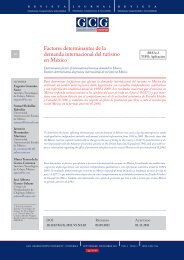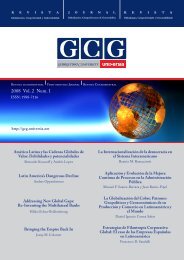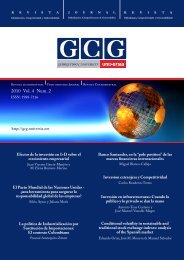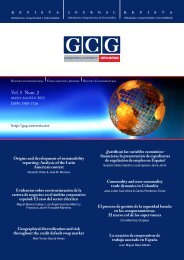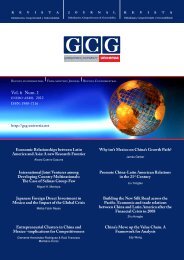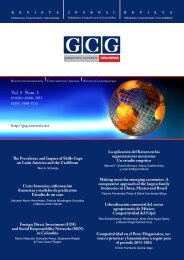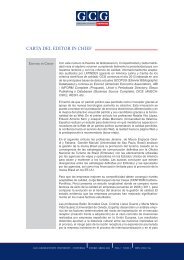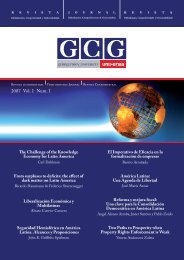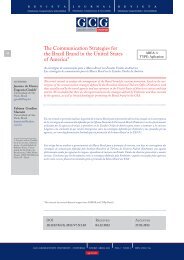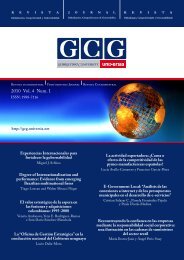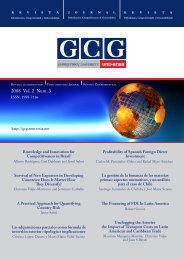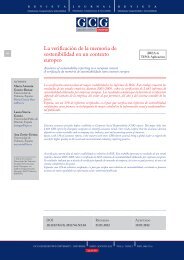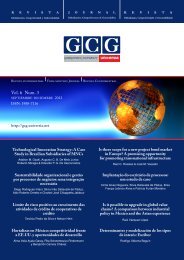Vol. 5 Num. 3 - GCG: Revista de Globalización, Competitividad y ...
Vol. 5 Num. 3 - GCG: Revista de Globalización, Competitividad y ...
Vol. 5 Num. 3 - GCG: Revista de Globalización, Competitividad y ...
- No tags were found...
You also want an ePaper? Increase the reach of your titles
YUMPU automatically turns print PDFs into web optimized ePapers that Google loves.
Juan Antonio Cerón-CruzComisión Europea (2010), “Public finances in EMU-2010”, Part. II, Chapter 6. Directorate General for Economic and financialaffairs.131Corsetti, G. y Müller, G. (2006), “Twin <strong>de</strong>ficits: squaring theory, evi<strong>de</strong>nce and common sense”, Economic Policy, octubre, pp.597-638.De la Dehesa, G. (2003), “Globalización, <strong>de</strong>sigualdad y pobreza”. Alianza Editorial. Madrid.De Grauwe, P. (2008), DSGE-Mo<strong>de</strong>lling. “When agents are imperfectly informed”, ECB Working Paper Series, 897.____________ (2010), “Fiscal policies in “normal” and “abnormal” recessions”, Voxeu.org, 30 <strong>de</strong> marzo.Debrun, X. y Kapoor, R. (2010), “Fiscal policy and macroeconomic stability: automatic stabilizers work, always and everywhere”,IMF Working Paper, 111.Duval, R., Elmeskov, J. y Vogel, L. (2007), “Structural Policies and Economic Resilience to Shocks”, OECD Economic DepartmentWorking Papers, No. 567, OECD, Paris.Dynan, K.n E., Elmendorf, D. y Sichel, D. (2006), “Can Financial Innovation Help to Explain the Reduced <strong>Vol</strong>atility of EconomicActivity?”, Journal of Monetary Economics, 53(1): 123–50.Eichengreen, B. (2002), “The globalization wars: An economist report from the front line”, Foreign Affairs, 81(4).FMI (2007), “Globalization, Financial Markets, and Fiscal Policy”, Fiscal Affairs Department.____ (2008), “Fiscal Policy as a countercyclical tool”, WEO (octubre)____ (2010), “Will it hurt? Macroeconomic effects of fiscal consolidation”, WEO, octubre, Chapter 3.Freedman, C., Kumhof, M., Laxton, D. y Lee, J. (2009), “The case for global fiscal stimulus”, IMF SPN 09/03.Galí, J. y Gambetti, L. (2009), “On the sources of the great mo<strong>de</strong>ration”, American Economic Journal: Macroeconomics, 1:1, 26–57http://www.aeaweb.org/articles.php?doi=10.1257/mac.1.1.26Galí, J., López-Salido, J. y Vallés, J. (2007), “Un<strong>de</strong>rstanding the effects of government spending on consumption”, Journal of EuropeanEconomic Association 5(1):227-270.Girouard, N. y André, C. (2005), “Measuring Cyclically adjusted Budget Balances for OECD Countries”, OECD EconomicsDepartment Working Papers, 434, OECD Publishing. doi: 10.1787/787626008442Hall, R. (2009), “By how much does GDP rise if the Government buys more output?. Comments and discussion”, Brookings Paperson economic Activity, Otoño, pp.183-249.Hemming, R., Kell, M. y Mahfouz, S. (2002), “The effectiveness of fiscal policy in stimulating economic activity – A review of theliterature”, IMF Working Paper, 02/208.Kaminsky, G., Reinhart, C. y Végh, C. (2004), “When it rains, it pours: procyclical capital flows and macroeconomic policies”,NBER working Paper nº 10780Keoane, R. (2002), “Power and governance in a partially globalized world”. Routledge, Londres. ISBN 0415288193.Kose, M., Otrok, C. y Prasad, S. (2008), “Global business cycles: convergence o <strong>de</strong>coupling?”, IMF WP 08/143.Krugman, P. (2008), “La hora <strong>de</strong> la política fiscal”, El Pais-Negocios. 19-10-2008<strong>GCG</strong> GEORGETOWN UNIVERSITY - UNIVERSIA SEPTIEMBRE-DICIEMBRE 2011 VOL. 5 NUM. 3 ISSN: 1988-7116pp: 116-133



